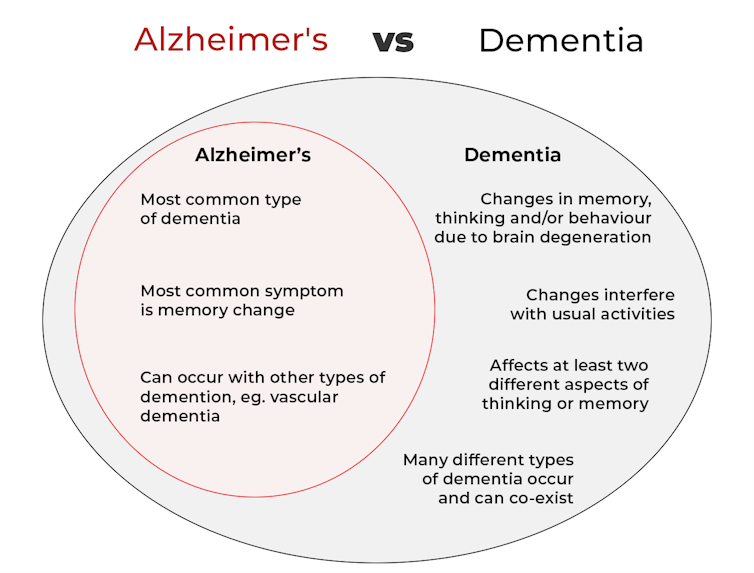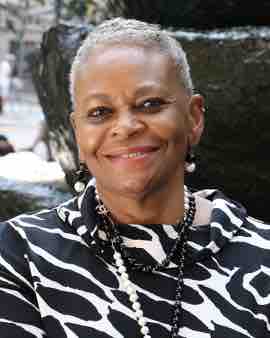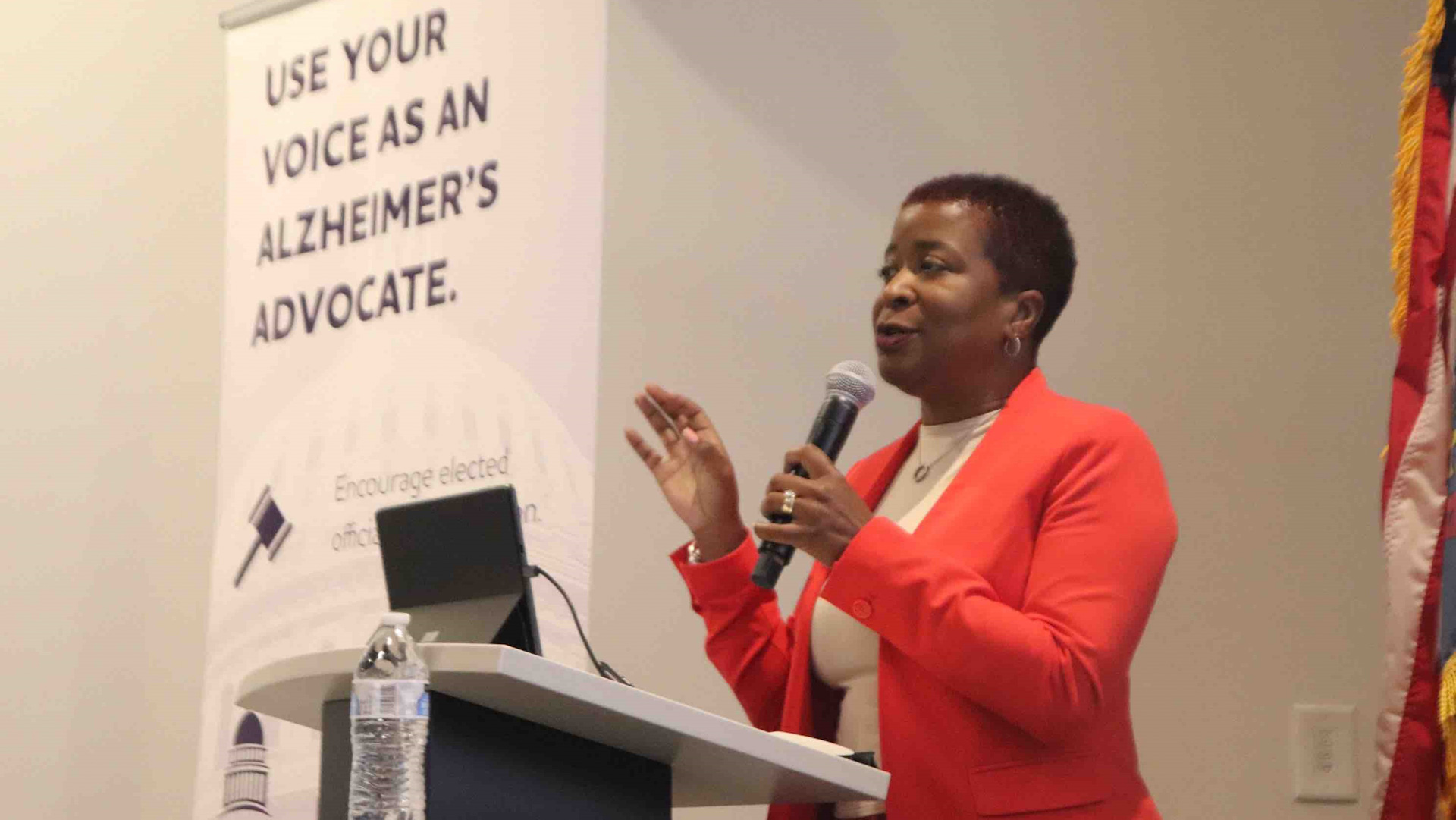MELITA TERRY, SENIOR COMMUNITY ENGAGEMENT COORDINATOR, UNIVERSITY OF PITTSBURGH ALZHEIMER’S DISEASE RESEARCH CENTER, GIVES A PRESENTATION AT THE AFRICAN AMERICAN SUMMIT ON DEMENTIA, JUNE 25, IN HOMESTEAD. (Photo by Rob Taylor Jr.)
by Genea L. Webb
For New Pittsburgh Courier
Alzheimer’s and dementia affect the lives of nearly seven million Americans. By the year 2050, that number is expected to escalate to nearly 13 million. Alzheimer’s was the fifth leading cause of death among people aged 65 and older in 2021. But it’s not just a global issue. Alzheimer’s is the seventh leading cause of death in Allegheny County. There is no cure for the disease.
Alarming statistics like these are why the Alzheimer’s Association, Greater Pa. Chapter, held its third annual African American Summit on Dementia on Tuesday, June 25, at Commonwealth Charter Academy, at the Waterfront in Homestead.
“Alzheimer’s and dementia are public health crises impacting millions of people and there are health disparities. While older Black Americans are twice as likely as older Whites to have Alzheimer’s or another dementia, they are less likely to be diagnosed,” explained Janey Cink, manager, program outreach, with the local Alzheimer’s Association. “Black Americans are less likely to trust the health care system and seek diagnosis or treatment for Alzheimer’s disease than other groups.”
Among Black Americans ages 70 and older, 21.3 percent are living with Alzheimer’s. Although research has yet to pinpoint a cause, it is believed that higher rates of cardiovascular disease may play a significant part.
“More and more people are being diagnosed with the disease and many are suffering in silence with a myriad of strange behavior. There is information and education out there for families to learn about the disease and if they notice any of these behaviors to get checked and don’t wait.” explained Diane Powell, Chair of Black Women For Positive Change and a community educator for the Alzheimer’s Association Greater PA Chapter.
Some warning signs of Alzheimer’s and dementia include forgetting things you just learned, problems managing money, getting lost in familiar places, confusion about the time of day, forgetting common words, constantly losing things, skipping social gatherings, loss of interest in reading and personality changes.
Getting regular exercise, eating a Mediterranean style diet, maintaining strong social relationships, and getting adequate sleep are ways to help with cognitive decline as one ages to try and help prevent or delay the onset of Alzheimer’s and dementia.

The summit was the culmination of events that occurred in the month of June. Earlier in the month, the organization held a weekend of events at the August Wilson African American Cultural Center, including the stage play, “Unforgettable,” which was penned by Garrett Davis. Davis wrote the play to pay homage to his late grandmother, Goodness, whose dementia diagnosis blindsided his family.
“I went home from college on spring break, and she didn’t know who I was. I was young and immature, and I didn’t go back because I couldn’t stand to see her like that,” recalled Davis, whose mother now suffers with Alzheimer’s Disease. He wrote the first version of the play, entitled, “Forget Me Not,” to pay homage to his family’s journey with the illness. That show toured for a decade, and he thought it was time to update the scenario to fit into today’s mix. That’s how “Unforgettable” was born.
“It’s a funny and enjoyable play, there’s a lightness to it. We are trying to take the heaviness out of Alzheimer’s. This has taken on a life of its own. It’s a movement now,” said Davis, who is working on a mental health project and a diabetes piece, which he hopes to put out in 2025.
The summit held on June 25 was moderated by WAMO 107.3 Sunday Gospel host Brother Marlon Martin, a tireless Alzheimer’s Association advocate. Martin told the New Pittsburgh Courier that he lost both of his parents, Douglas and Ercell Martin, to Alzheimer’s. Martin’s father, Douglas, passed in August 2014. His mother, Ercell, passed in April 2023.
Ercell Martin was the caregiver for her husband, Douglas, when he was diagnosed with Alzheimer’s in 1997. “We ultimately had to put him in a nursing home (Southwestern Veterans Center), but my mom became an advocate for everyone on the floor in his facility,” Marlon Martin told the Courier. “She became known as the person that would get things done.”
Marlon Martin recalled his father as a community leader, state constable, “he was active in our church…and so watching him now not remember who we were, not remember how to take care of himself, it was really difficult during that time.”
Martin added: “When it happened to my mom, it hit me even harder. When it was my dad, me and my mom went through it together…but when it was my mom, I realized I’m doing this alone. It was difficult to have to go through that whole process all over again of watching your loved one deteriorate right before your eyes.”
Throughout the three-hour summit, Melita Terry, with the University of Pittsburgh Alzheimer’s Disease Research Center, gave pertinent tips on participating in clinical trials, and there was a discussion featuring scheduled panelists Amber Snyder of Bethel AME Church, Lisa Martinelli with Allegheny Health Network, Dr. Jermaine McKinley with Bethesda United Presbyterian Church, Sara Murphy with the local Alzheimer’s Association, Terry, and Dr. James Weeden with the Allegheny County Health Department.

DR. MARGARET LARKINS-PETTIGREW
The keynote speaker was Dr. Margaret Larkins-Pettigrew, Senior Vice President and Chief Diversity Officer for Allegheny Health Network.
In an exclusive interview with the Courier following her presentation, Dr. Pettigrew doubled down on how she believed that the racism that African Americans have experienced and still experience in the U.S. “really does interfere with some of the health care that we receive as well as the research that we do,” she said. Many African Americans who are diagnosed with Alzheimer’s “have a history of toxic stress, just like all African Americans have in this country, and we need to be aware of that, because it does add to the complications of Alzheimer’s. Most people who come into a state of Alzheimer’s already have some comorbidities,” or the presence of two or more medical conditions in a patient, “because they are African American.”
As mentioned previously, Alzheimer’s is the seventh-leading cause of death in Allegheny County, according to county data. In 2023, the county won a federal grant of $1.85 million over five years to support its residents with Alzheimer’s.
Dr. Pettigrew added: “We all have to be on this Diversity, Equity and Inclusion journey to give better health care and health access to those individuals who suffer from Alzheimer’s.”
(Rob Taylor Jr. contributed to this story.)

